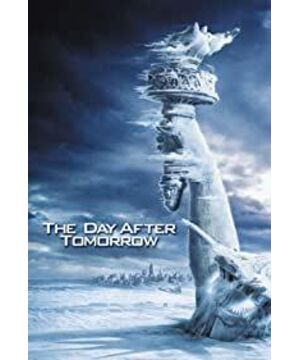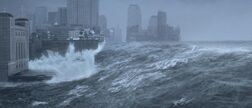"The day after tomorrow" is also supported by a very robust scientific theory. Jack, a climatologist played by Dennis Quaid, whose research interests include the use of climate data from the Holocene (the geological period of the last 10,000 years) to build climate models to predict future climate change. The highlight of its model is the ocean conveyor belt theory, which was proposed in the late 1980s by Wally Broecker of the Department of Earth and Environment at Columbia University in the real scientific community. Who is Broecker? In the field of paleoocean and paleoclimatology, it is a god-like existence. A joke circulating in this circle is that what he writes in the back garden in an afternoon can lead the field in a new direction. By the way, it is unavoidable to mention that he has published more than 80 Nature and Science articles so far.
One summer many years ago, a certain institution of the Chinese Academy of Sciences invited Broecker and another big bull, Denton, to give a report in China. At that time, at the command of the boss, we also dispatched the whole team to the event. At that time, he happened to be sitting about one meter away from Broecker, watching the 80-year-old God stand tremblingly and finish the report, and his heart was also extremely surging. After the meeting, a classmate asked Broecker, will
Last night, I went to the library to borrow books in the smog. I was looking for books in the bookshelves. When I looked up, I saw a book published by Broecker in 2010. It has been translated into Chinese, it is called "Ocean Conveyor Belt", just a graduate student The days when I read the English version came to my mind. At that time, I wanted to translate it myself to save it as a document.... The beginning of the translation was a message specially written by him for the Chinese translation. I continued to translate it, and when I saw the preface on the first few pages, I suddenly understood the time. During the lecture, he gave one of the reasons why he gave a thumbs down to 'the day after tomorrow' using models to predict climate change, as stated in the book:
"My thinking is seldom influenced by computer simulations, and in my opinion, they rarely succeed as expected. It's fair to say that, to a large extent, simulations are nothing more than an attempt to replicate paleoclimate observations."
Of course , the work of simulation is not unimportant, Wallace wrote:
"But I am not saying that previous attempts to build effective models to simulate the past are unimportant, in fact, they are very important!"
Although, he added: (
"In the Until the model can satisfactorily reproduce the past, its predictions of the impact of fossil fuel carbon dioxide emissions will remain in doubt"
Well, let's talk about something else... The return of the Earth to the ice age in "The Day After Tomorrow" happened in two weeks The three unprecedented super storms, according to the history of geological science, should belong to the "catastrophic theory". Is it possible to become a reality in life, or move a small bench and wait for the addition of meteorologists.
View more about The Day After Tomorrow reviews











